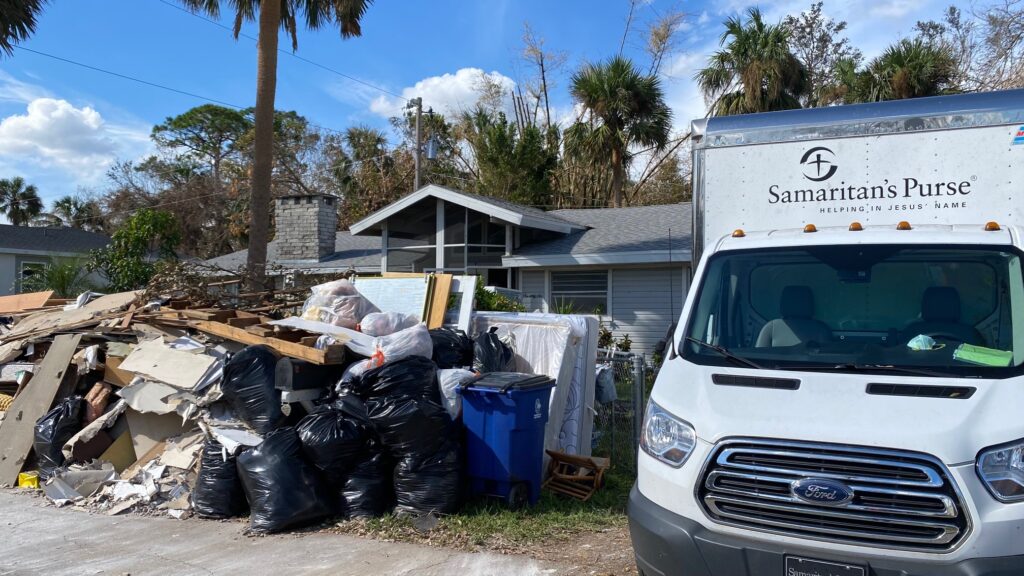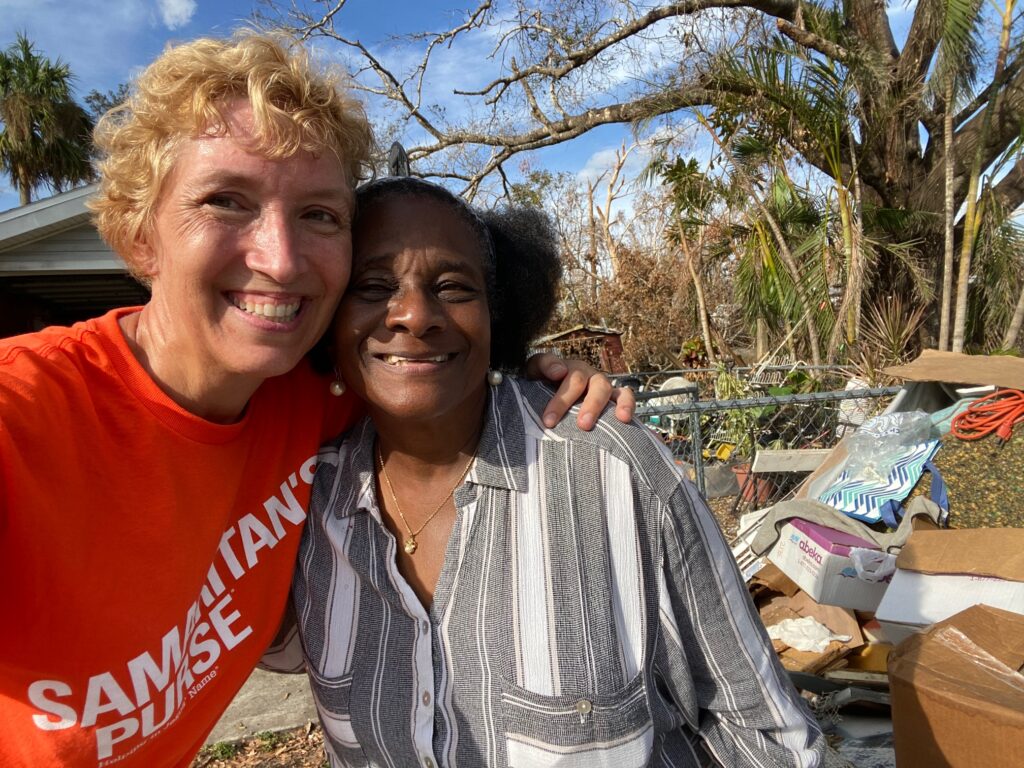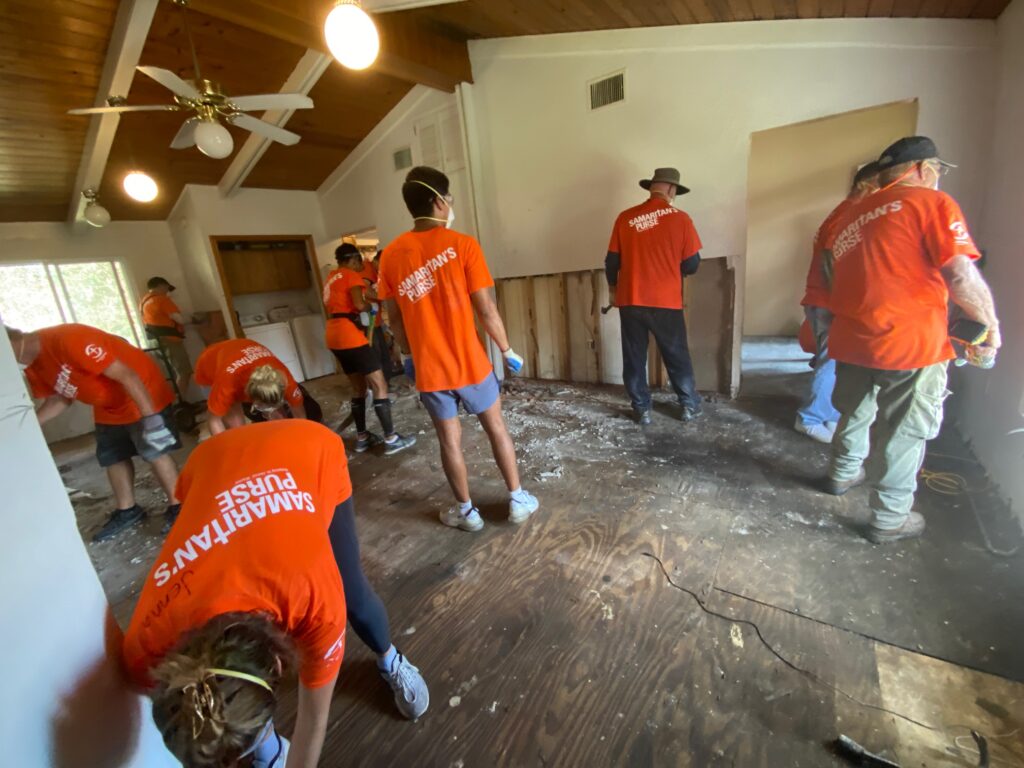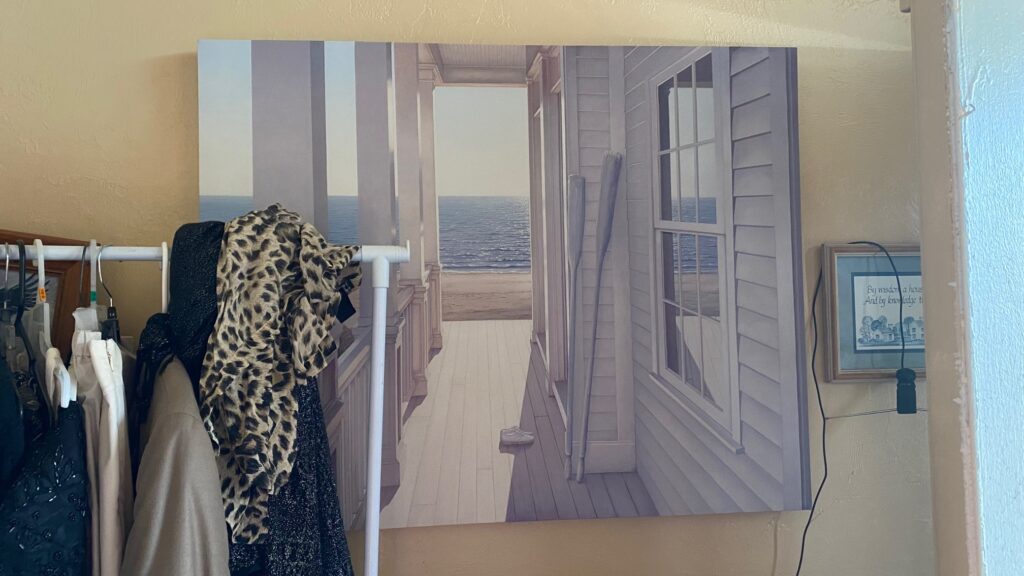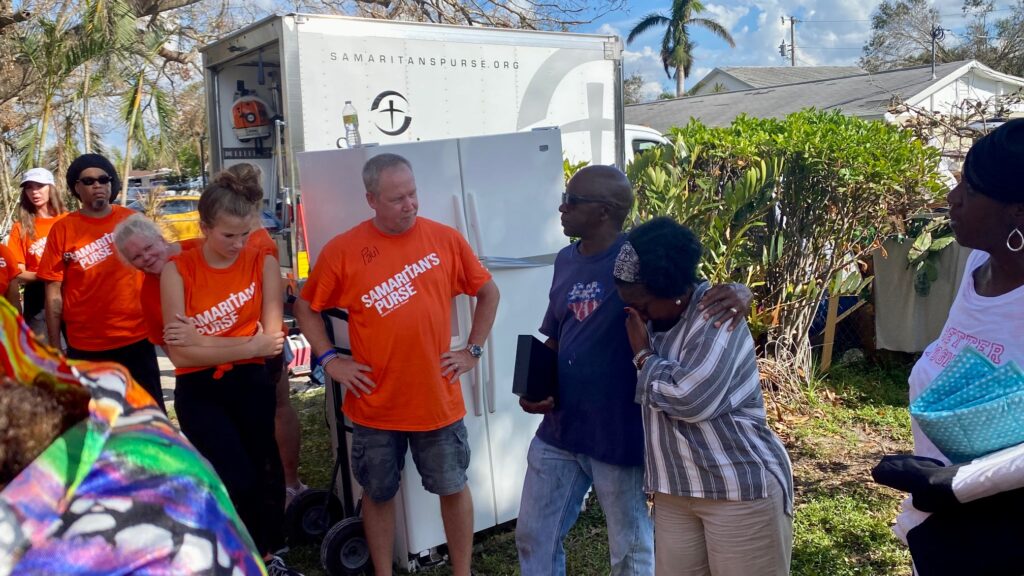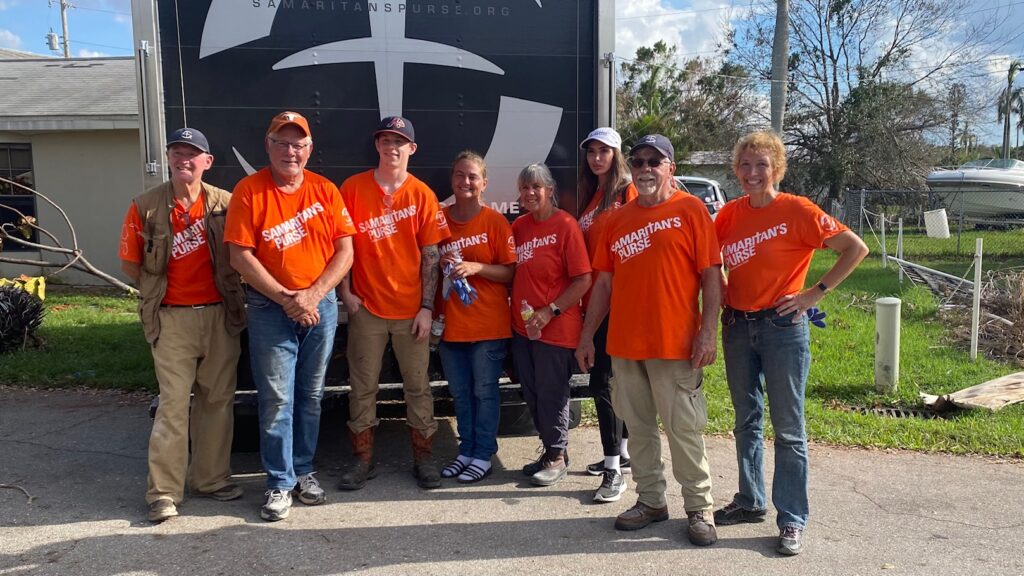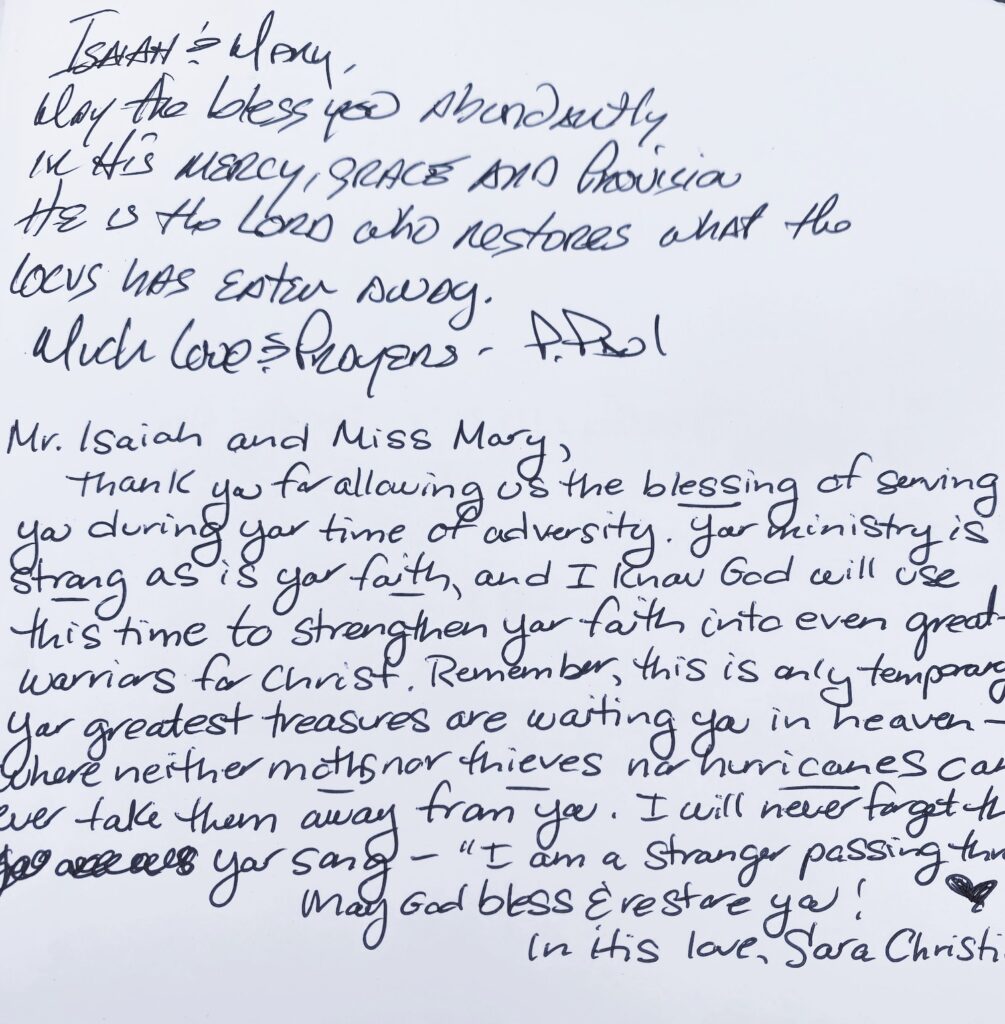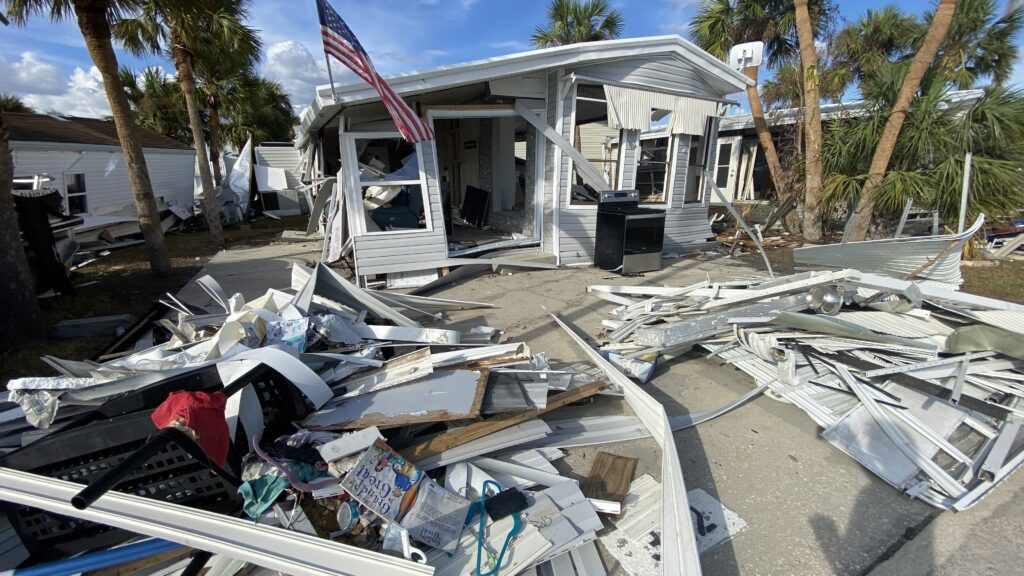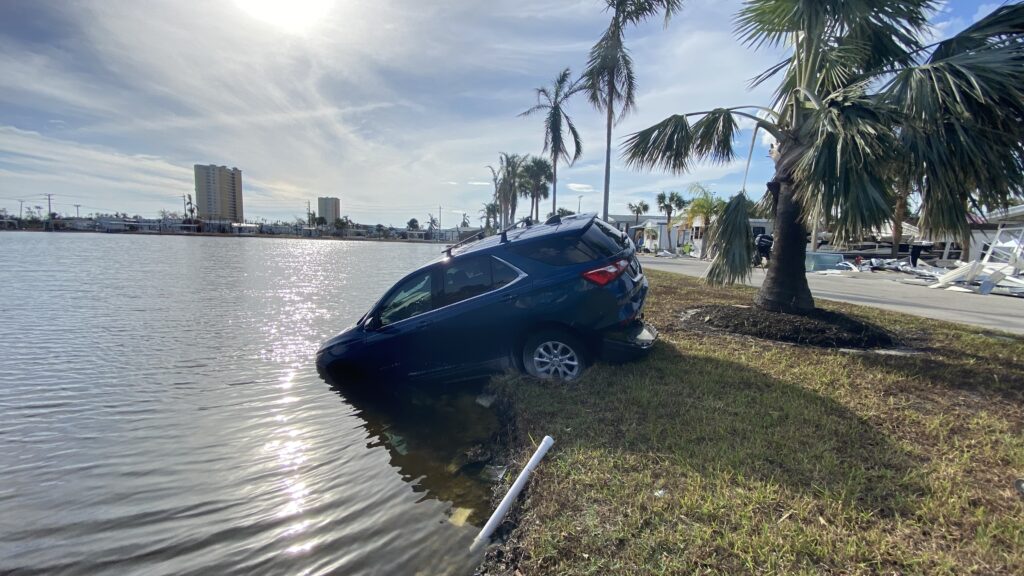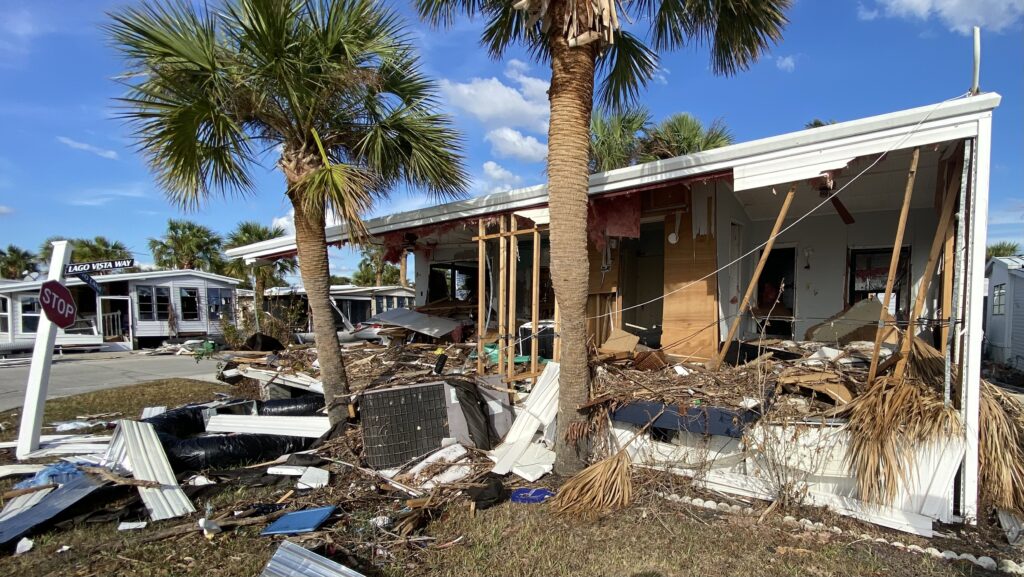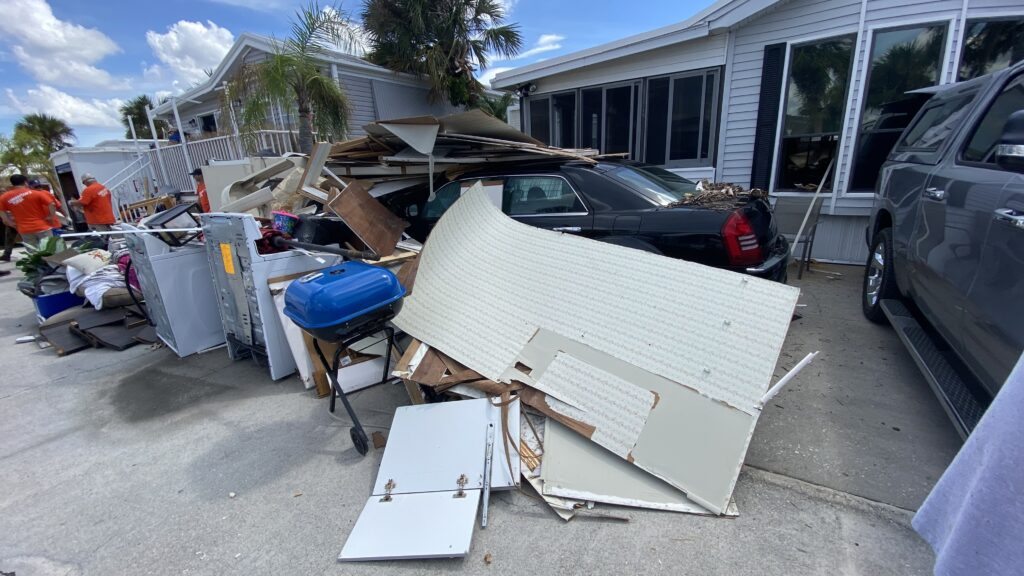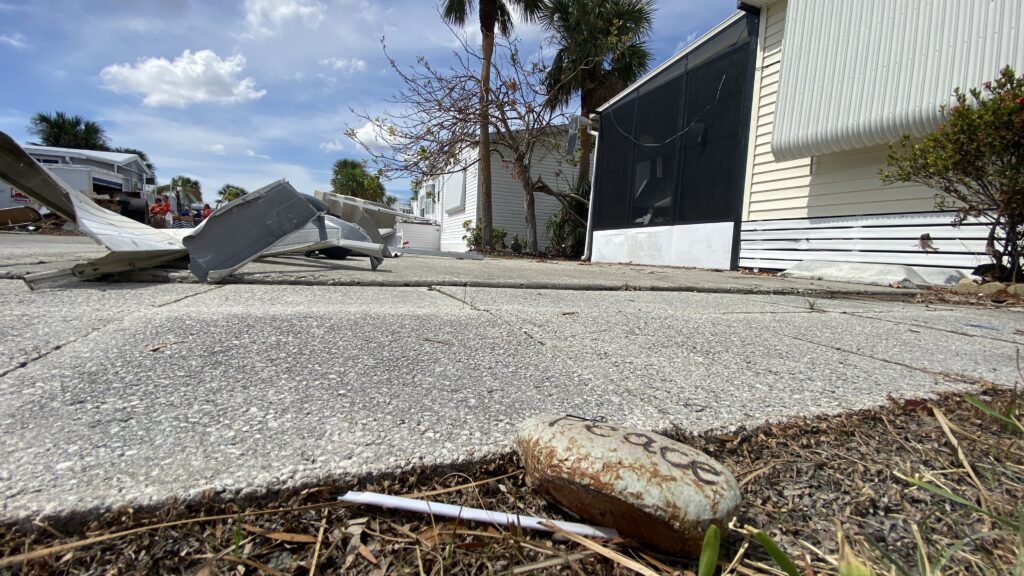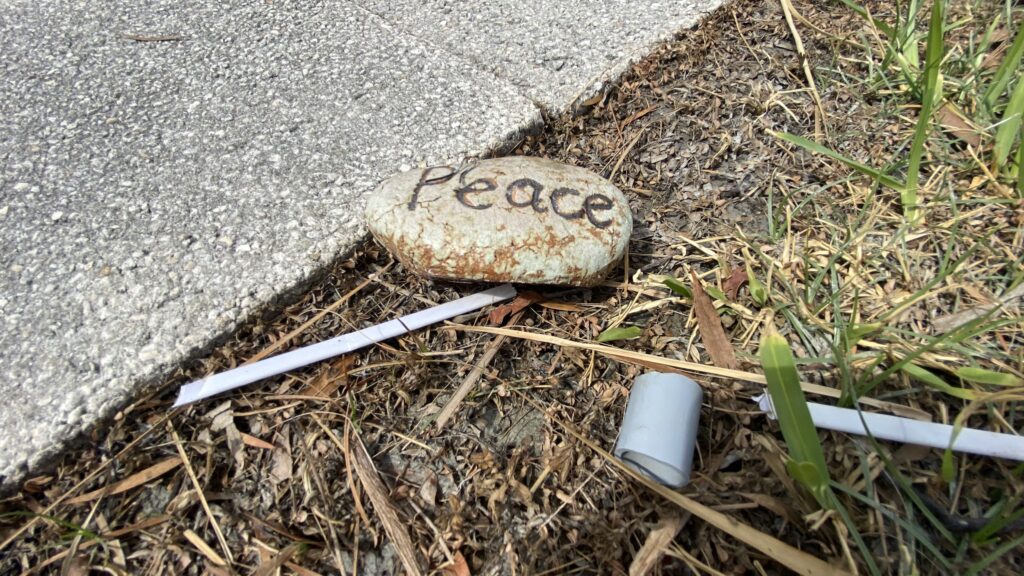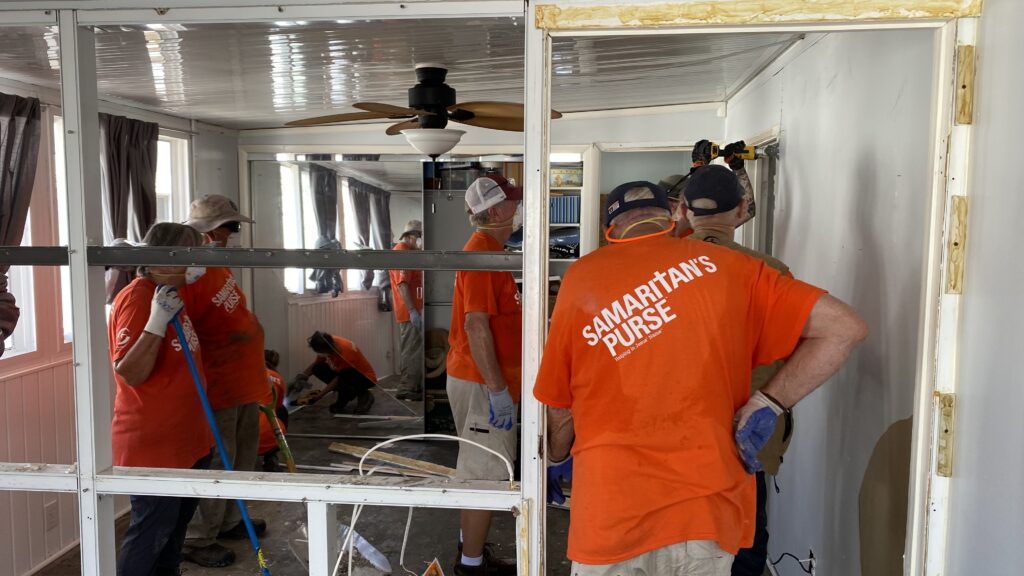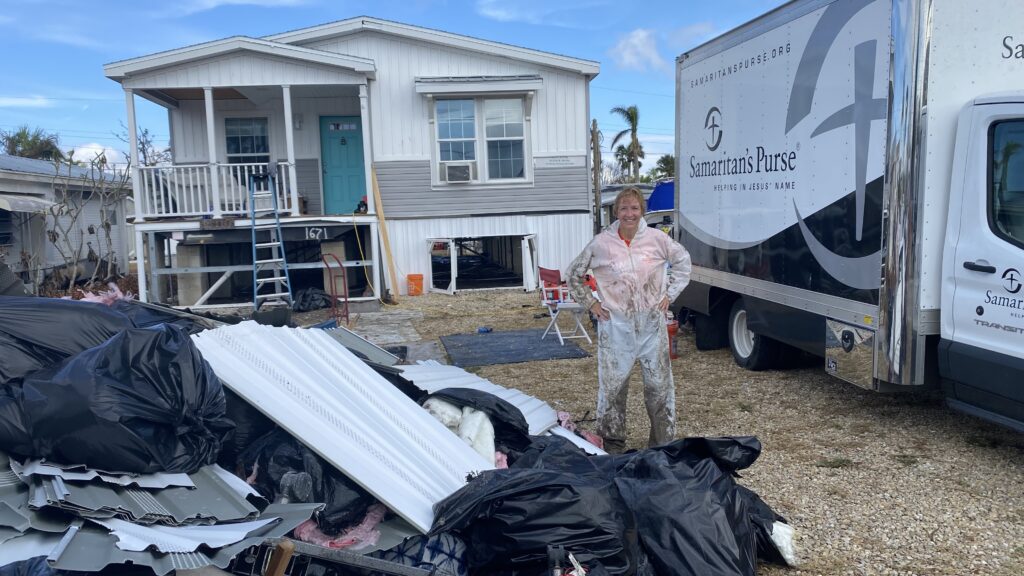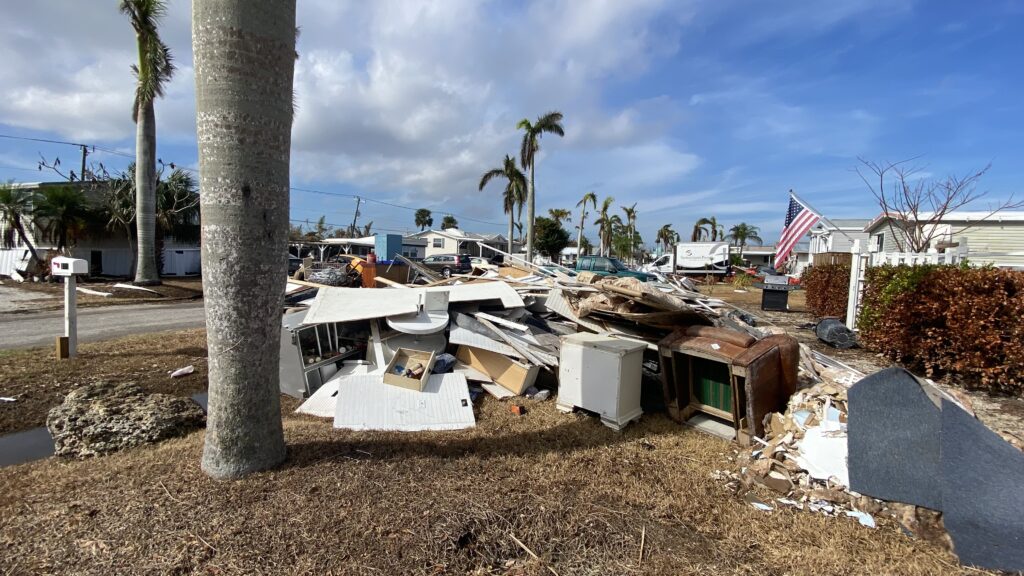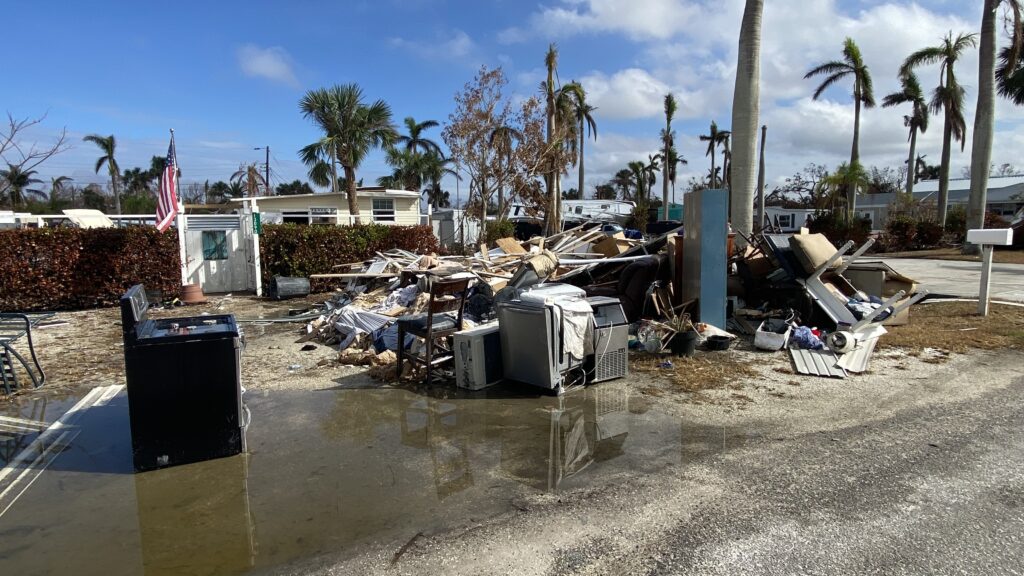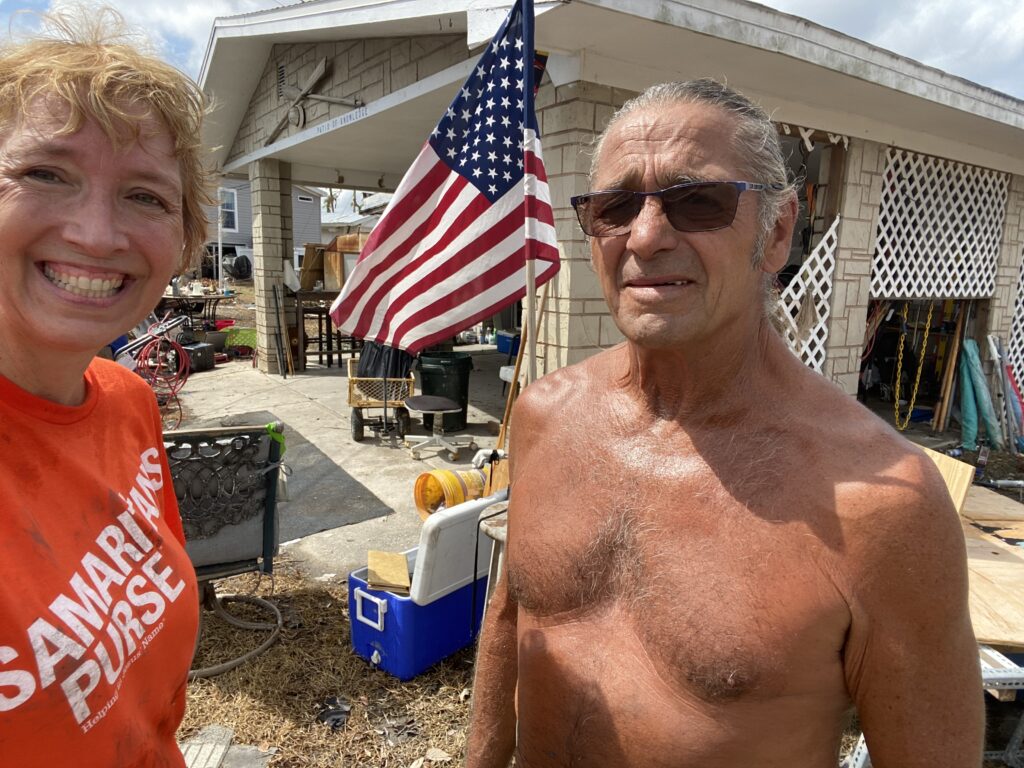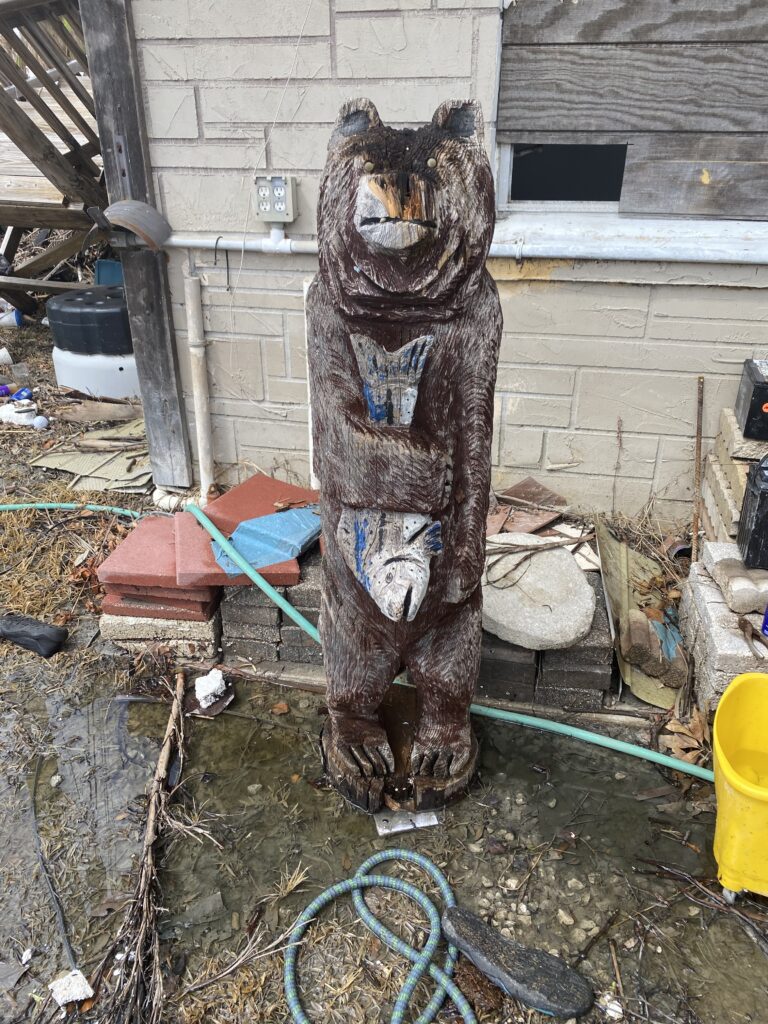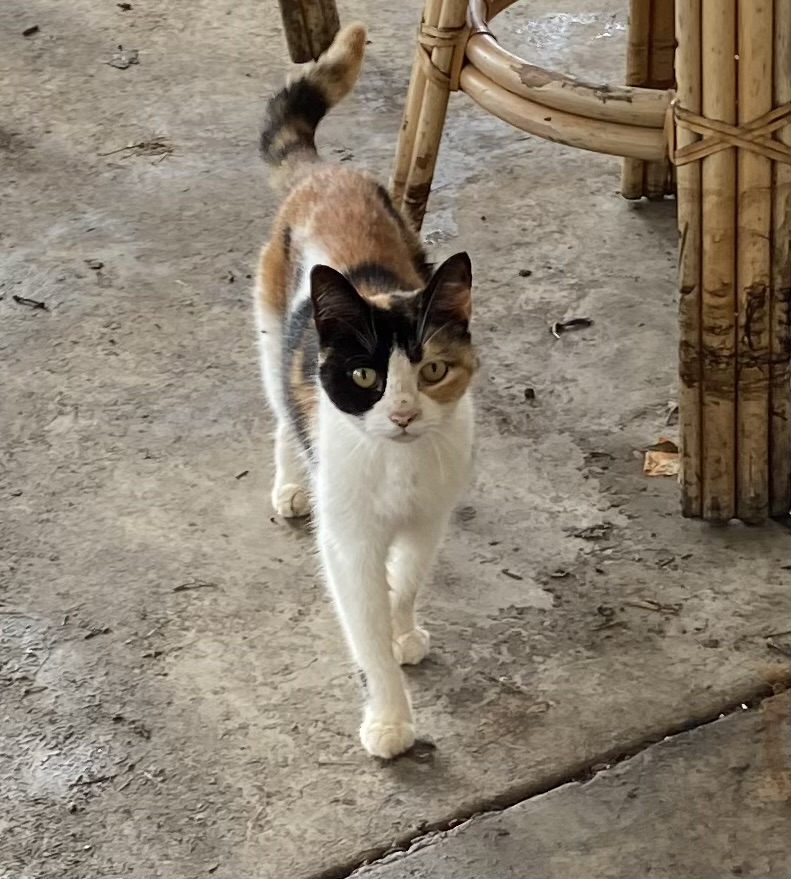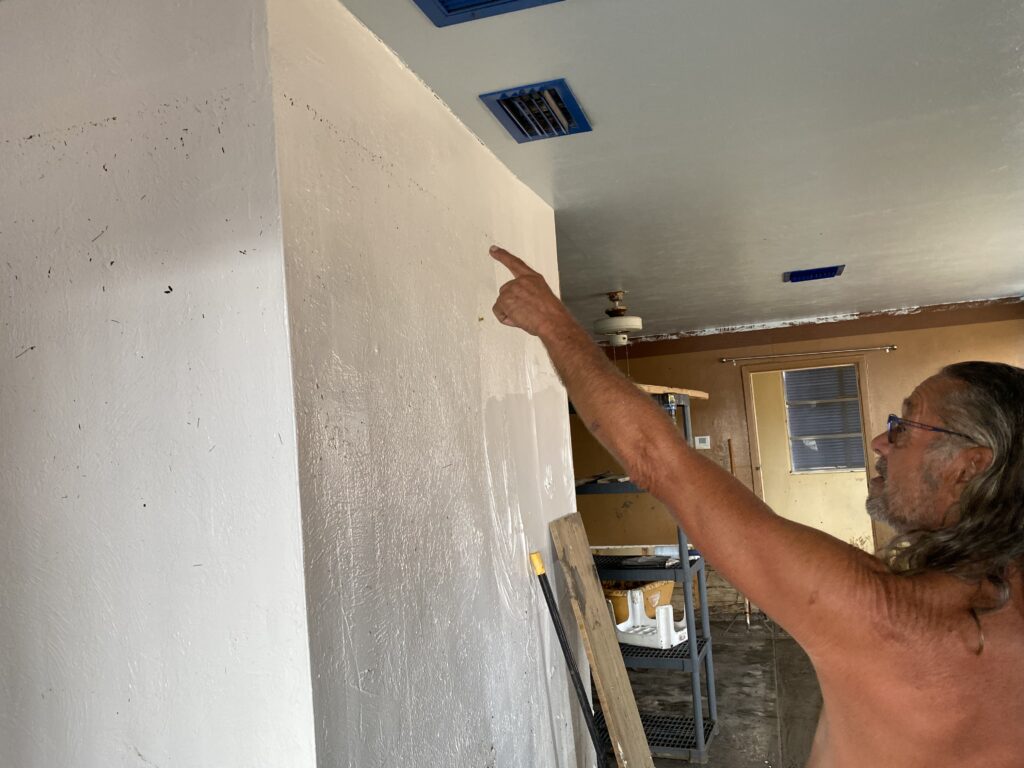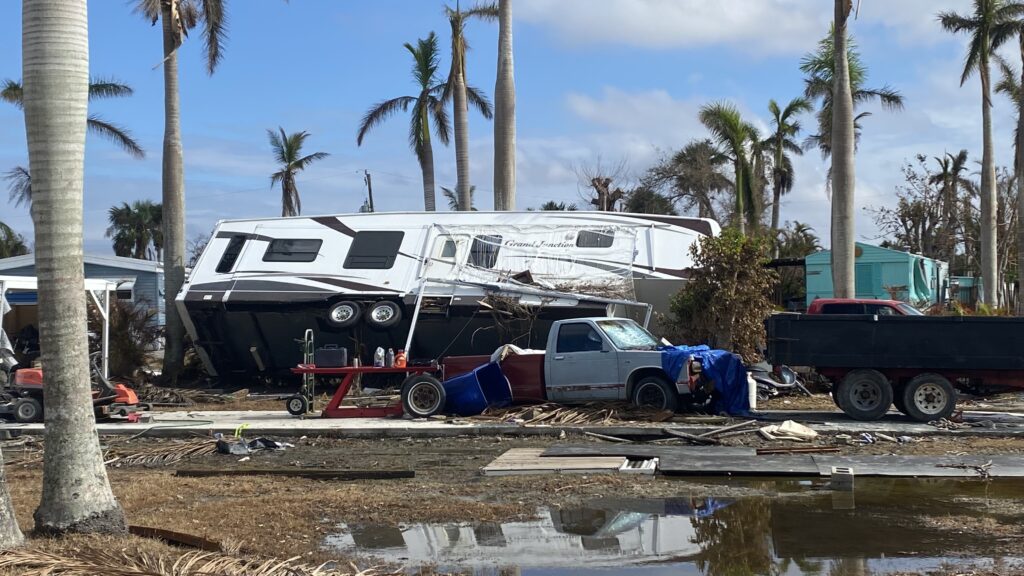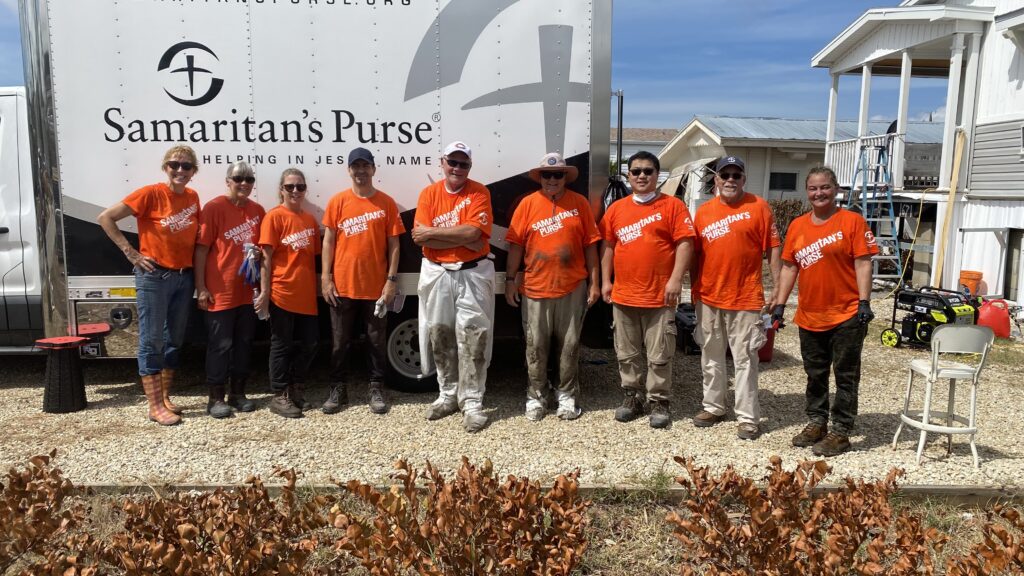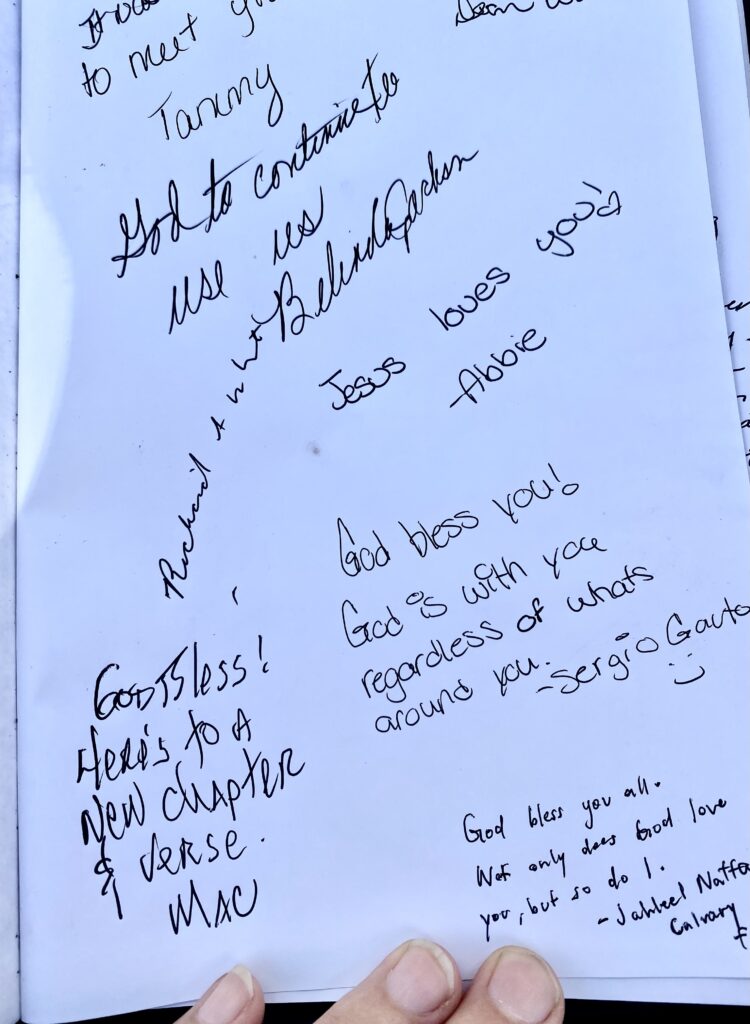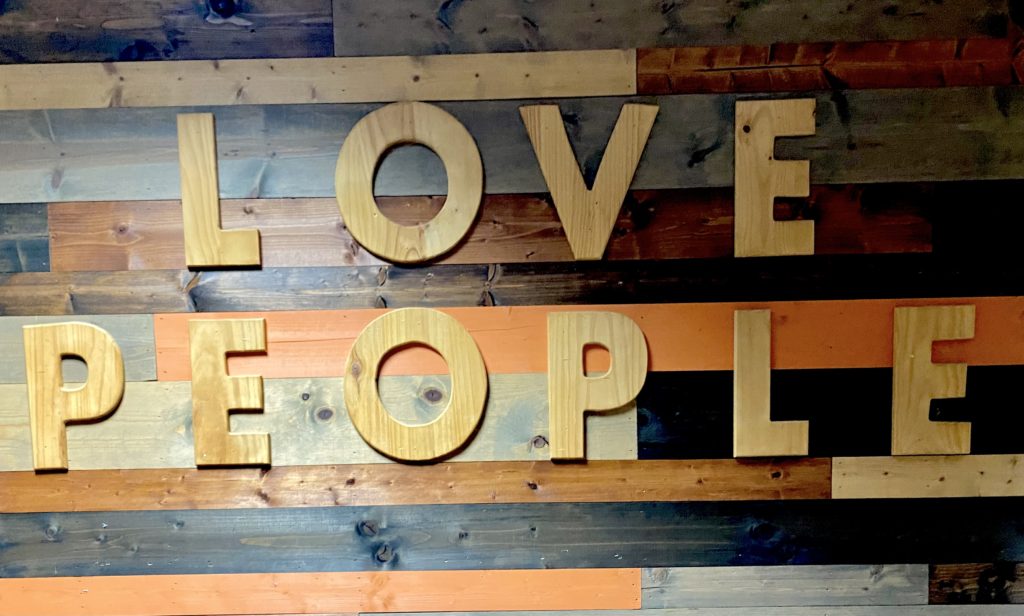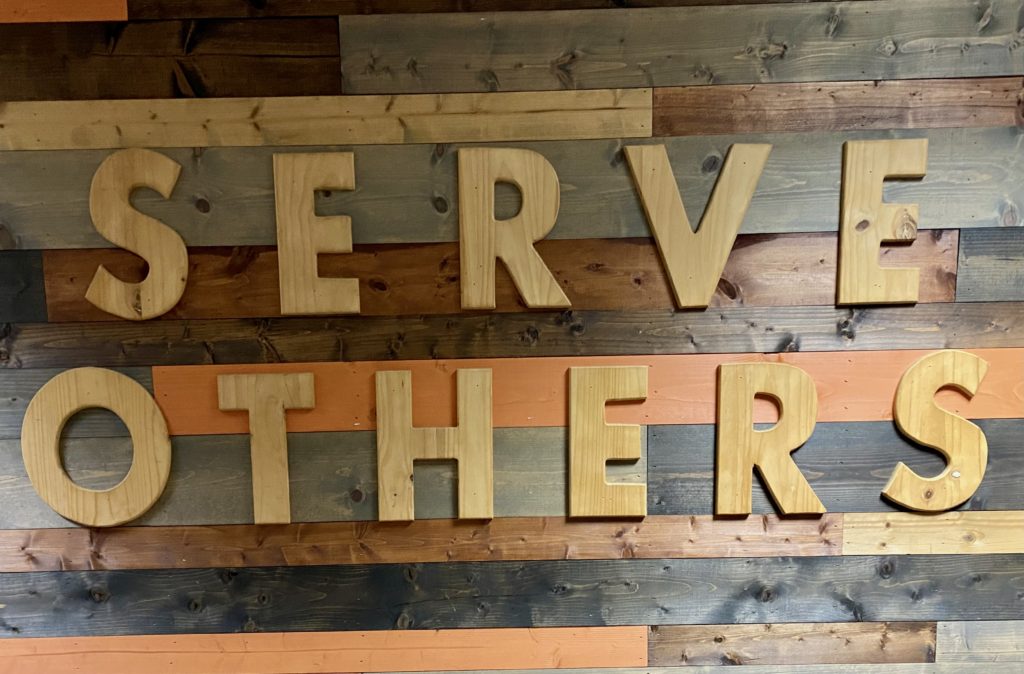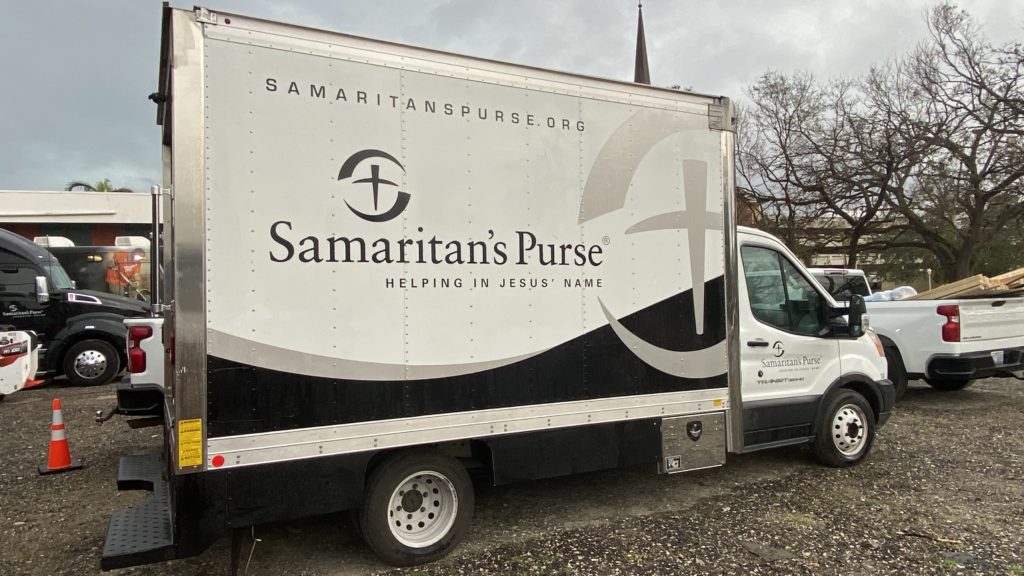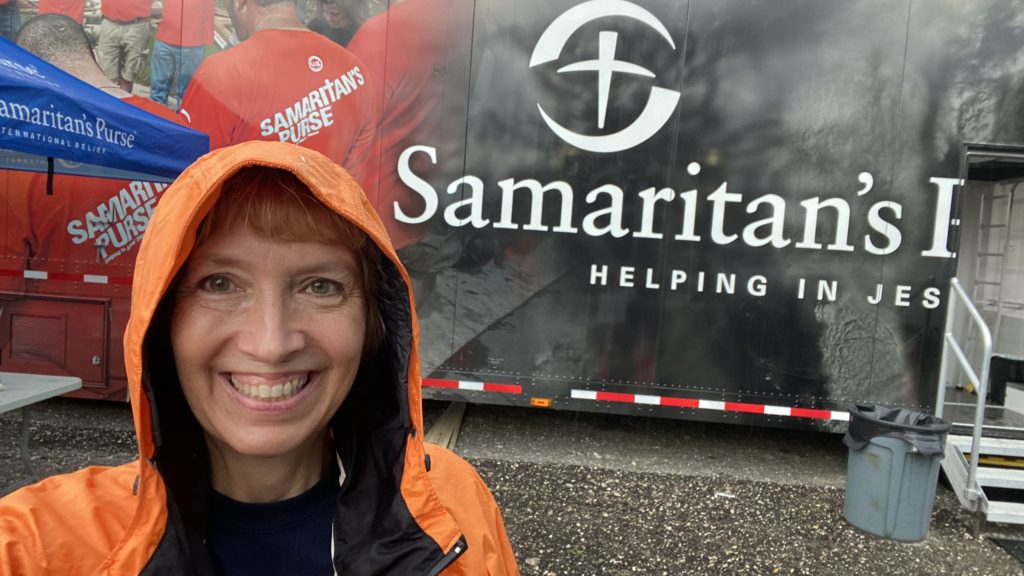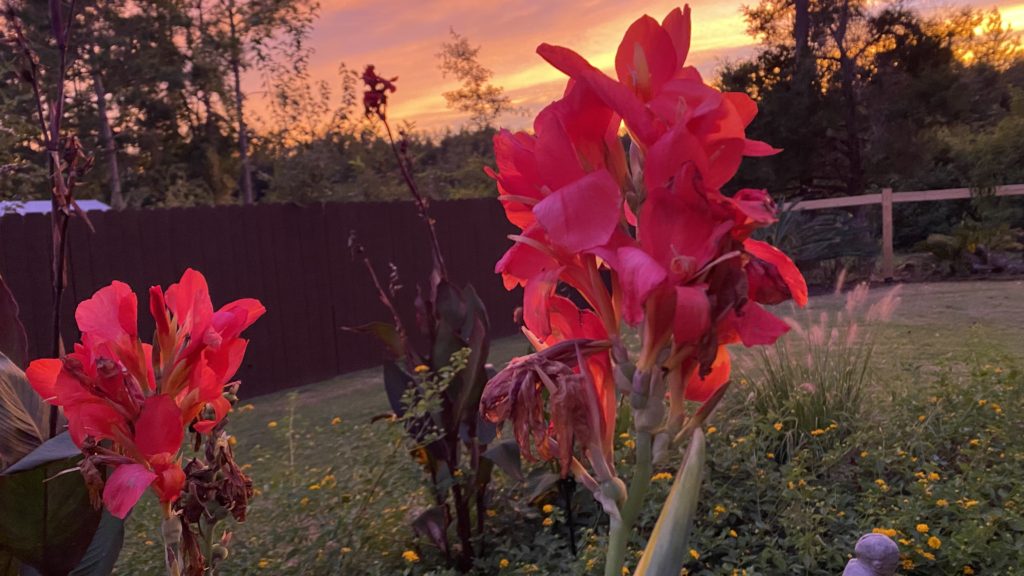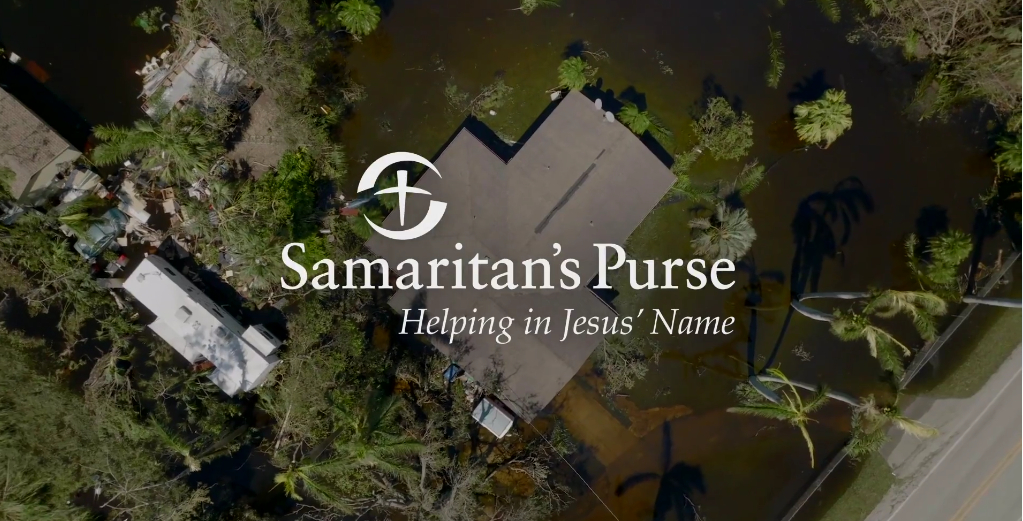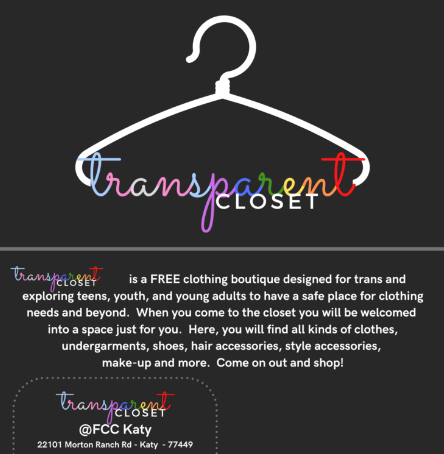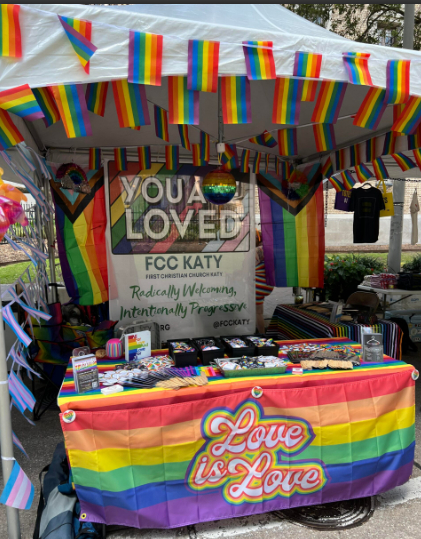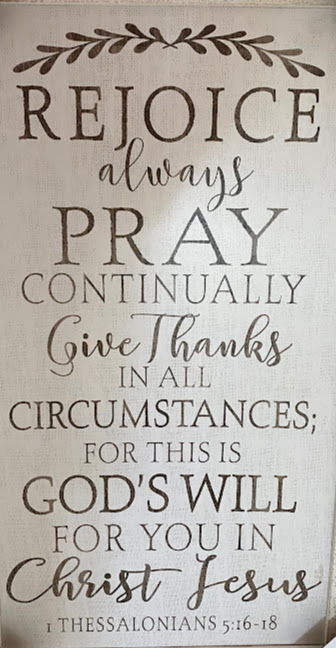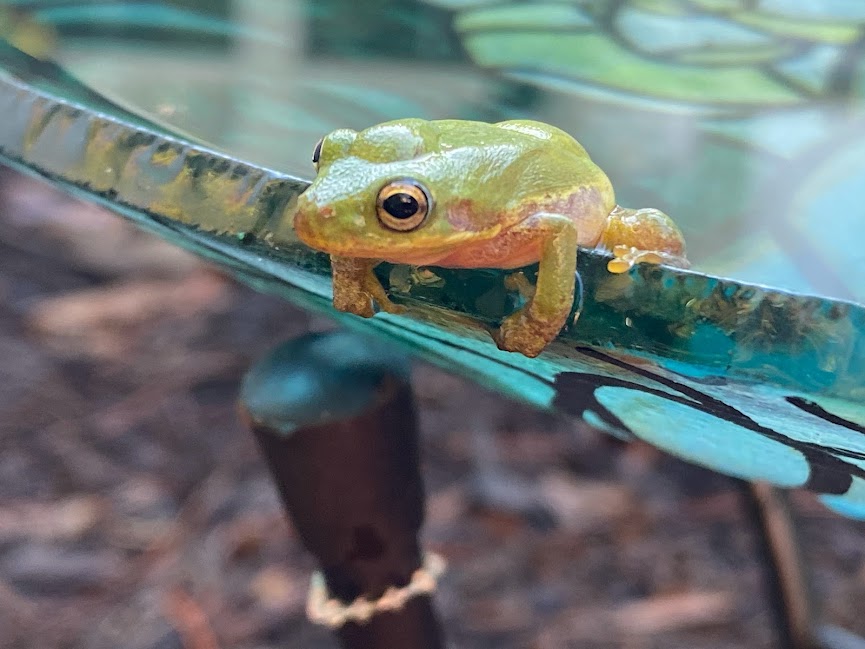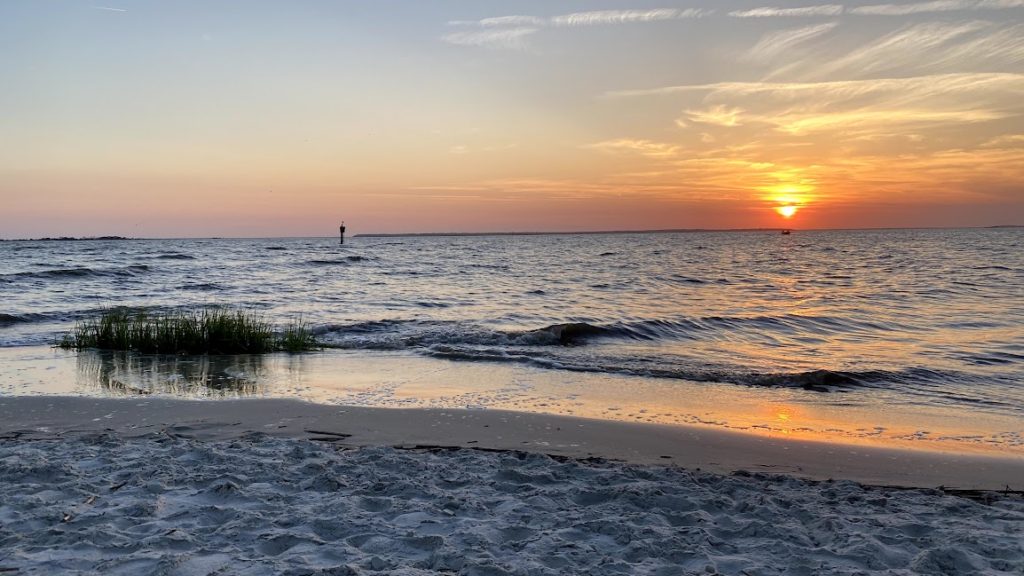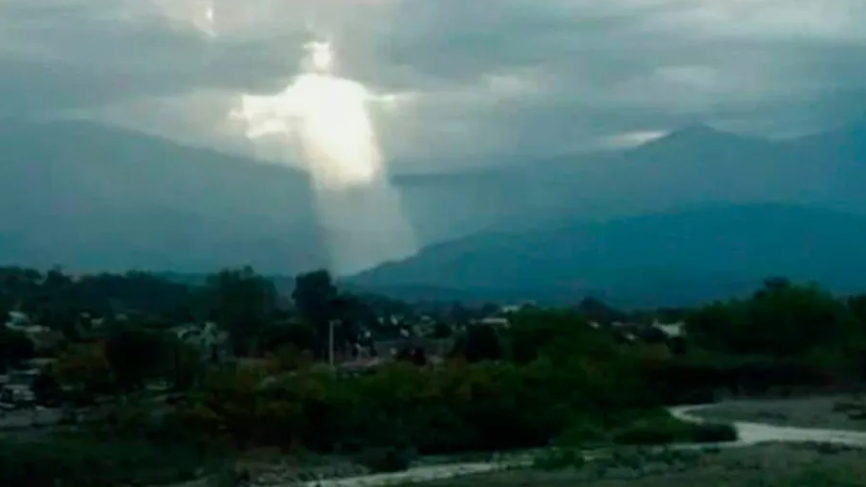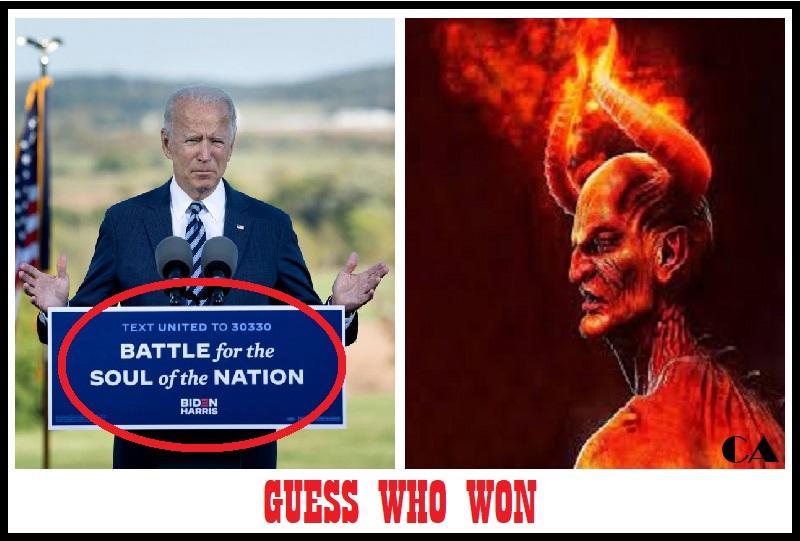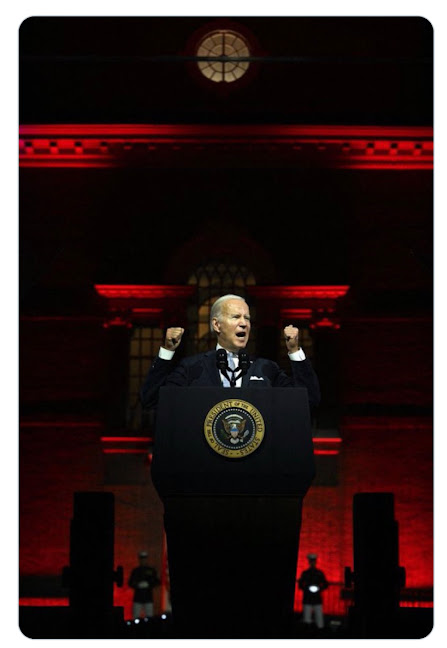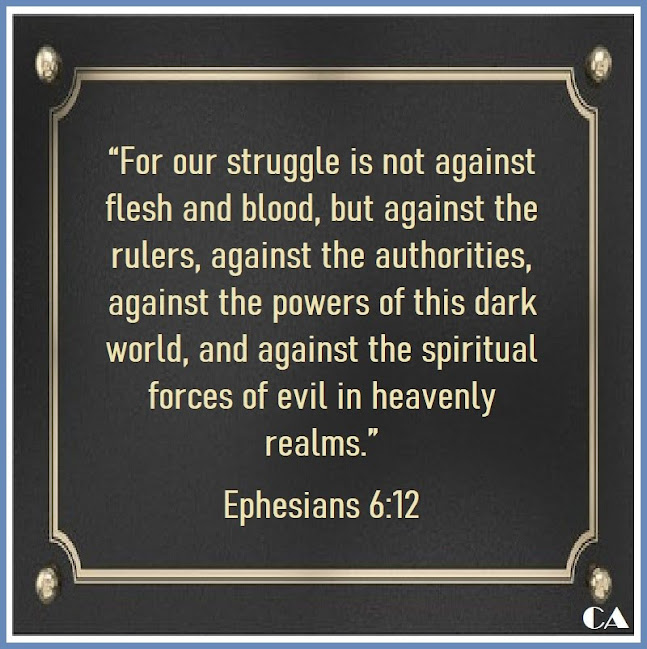You can make a difference – Samaritan’s Purse Deployment, Part 5
I became a servant of this gospel by the gift of God’s grace given me through the working of his power. (Ephesians 3:7)
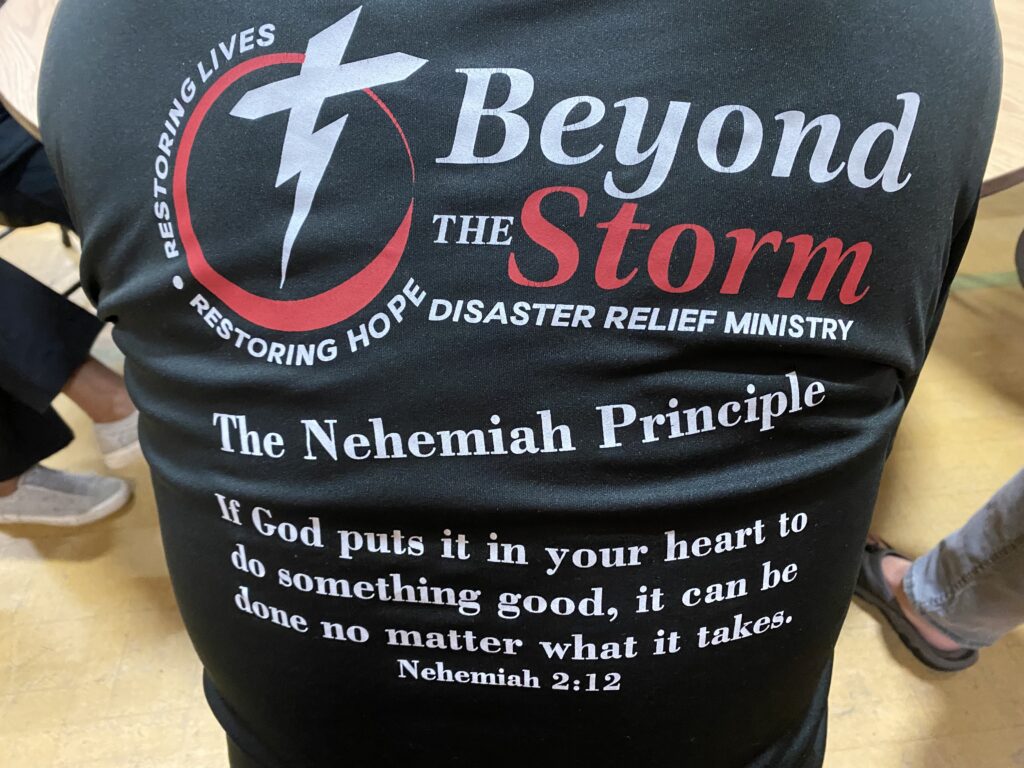
On the first night of my Samaritan’s Purse (SP) deployment in Fort Myers, FL, I shared my evening meal with five Beyond The Storm (BTS) team members. From my initial interaction with this group, clad in their matching black t-shirts with the BTS logo and Bible verses, I knew this team was exceptional.
One of their members, Ray, started talking to me as soon as he sat down, and I immediately felt I was no longer a stranger in a strange land but welcomed home by family.

BTS is a disaster relief ministry based out of Seminole, FL. As partners with Samaritan’s Purse, BTS exists to “take the light and hope of Jesus Christ to those in need.” They arrive together in their ministry bus, serve as a team to prep homes for restoration work, and host their own Bible study sessions after the day’s work is complete. I was hooked by one meal and a single Bible study with the group. When they asked me to join them, I didn’t hesitate. After securing permission from SP leadership, I accompanied BTS on their Wednesday deployment.
Wednesday was day two for BTS to complete demolition work in the home we were assigned to assist. The team’s lead, Ken, asked me to empty the kitchen cabinets while other team members finished their floorboard extraction, drywall cuts, and final clean-up.
As I later ran a broom through the rooms, one of the young ladies began singing “Great is Thy Faithfulness,” to which the other women in the group and I joined in. Although the moment passed quickly, it reaffirmed my joy in serving alongside other passionate believers.
While we completed our interior work, Ken moved next door to inquire if the homeowner would like help tarping his damaged roof. The British homeowner, Eric, initially seemed reluctant to accept assistance but eventually granted permission for our team to cover his roof and perform minor exterior debris removal. Hoping to help, I was advised that the situation was under control. I felt like the odd man out – being new, not entirely needed, and struggling to find something to do.
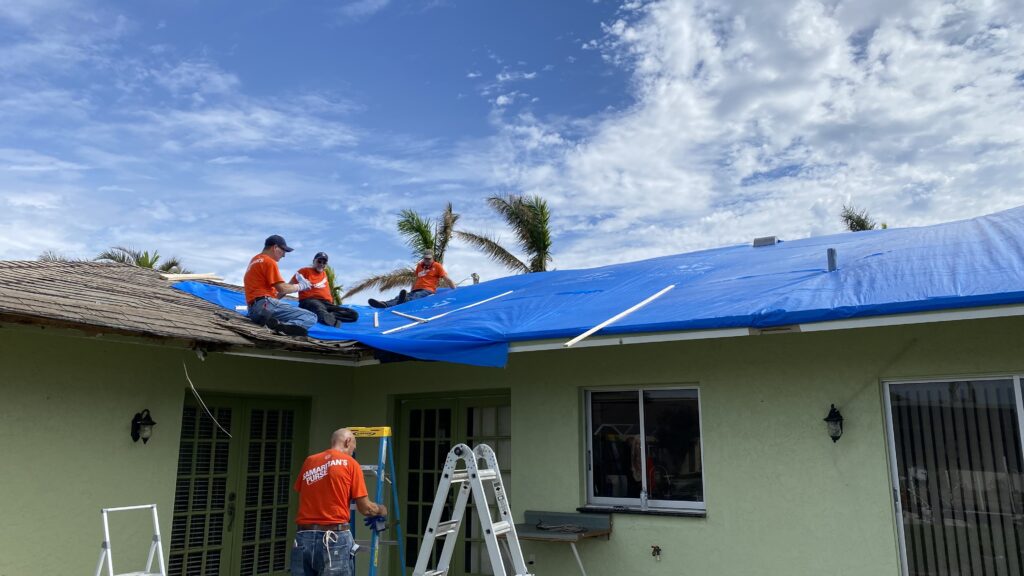
After the first home was deemed clean, one of the BTS team members, Sarah, volunteered to spray the home’s wall joists with a mold inhibitor called ShockWave. During the chemical application, the rest of us vacated the house. We then moved next door to begin our next assignment.
“Just walk the yard and pick up debris,” Ken told me. “The homeowner doesn’t really want us to do anything.”
When I asked if I should remove a garbage bag near the front porch, Ken advised me to leave it alone since we weren’t explicitly asked to touch it.

After dragging branches and boards to the curb, I began removing storm-blown items from the area near Eric’s front window, purposely allowing him to see what I was doing. While I was doing so, Ken brought Sarah over to spray ShockWave inside the owner’s home.
“Eric agreed to our interior spray, but I need you to go in with her,” Ken said. “Just let the owner know that you’re there to help move anything she needs you to.”
SP rules don’t allow women to be in one-on-one situations with men, so I understood the intent and was more than happy to comply. In fact, a conversation with the owner was precisely what I had been missing in the day’s labor.
Upon entry, I announced my presence to Eric and advised him that I had come to help. Remembering that he was British, I asked Eric where he resided in the UK. After hearing his response, I explained that one of the executives I support in my workplace lives near Windsor, where Queen Elizabeth II had recently been buried.

“Wasn’t the queen’s funeral incredible?” I asked Eric. “Watching it made me want to research the significance of all those who participated in the ceremony. Every action seemed symbolic.” Eric agreed and appeared to visibly warm at my connection to his country and queen.
As we chatted further, I learned that Eric and his wife were in England when the storm hit. He later flew to the States to view the storm’s damage to their home. His wife chose to remain in the UK. “We’re not going to rebuild,” he explained. “We’ll just save what we can and sell the house ‘as is.’”
After moving to the living room, Sarah asked me to move a few pieces of furniture to allow her better access to the walls. The first items I needed to bring out were nested tables. After picking them up, Eric commented that he needed to discard them. “I’ll put those out later,” he said. “I’m not keeping them.”
“I’ll be happy to take them outside for you now,” I told him. “Would you like me to do so?”
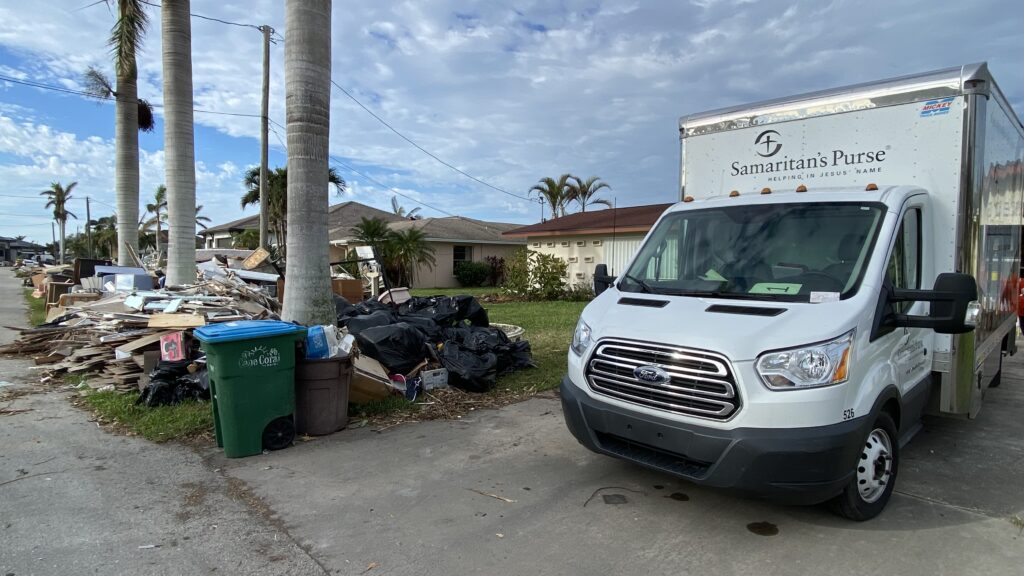
“I don’t want to bother you,” came the reply.
“It’s no bother at all,” I assured him. “That’s why we’re here – to help!”
“Alright,” he agreed.
“If there’s anything else you’d like me to remove, just let me know,” I advised Eric as I moved to the door.
“I think I’m okay,” came the reply.
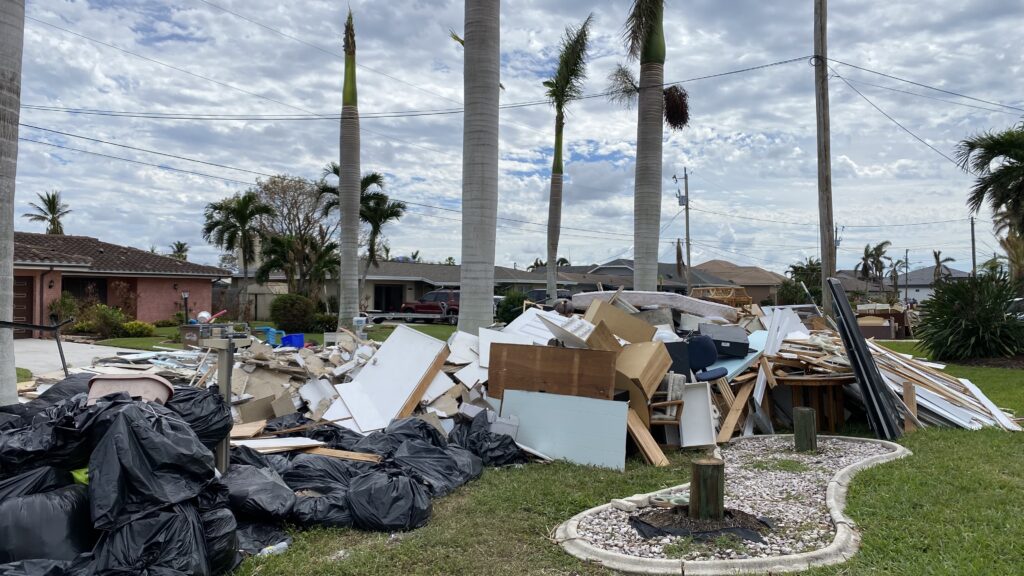
I smiled and added the tables to the massive pile of debris extending the length of Eric’s lawn on both sides of his driveway.
When I returned to the house, Eric had a contractor’s bag near the door where he was currently placing discards. “Are these items that you’d like to go out?” I inquired.
“Yes, they can go,” Eric said.
“That’s great,” I replied. “Whatever you would like me to remove, please just let me know.”
One bag, one item at a time, Eric consented to my removal of many additional possessions from his living room and kitchen. As other team members saw what I was doing, they came to help. “Can we go in?” they asked.
“Not just yet,” I explained. “The owner has just agreed for me to carry a few things out. Let’s see how he feels about others helping, as well.”
Returning inside, I asked Eric about the bag on the porch.
“Which one?” Eric replied.
“Would you like to come outside, and see?” I asked.
“Yes,” Eric said. “I need to know what you’re talking about.”
Once he was outside, I asked Eric if we could help him remove anything from his garage, as the door was open. “Let me look,” he said.
As he walked over, Sarah came outside and laid down her ShockWave spray pack. “What can I do?” she asked.
The two of us joined Eric as he stood gazing into his garage.
“If you’d like to just point to whatever you’d like us to remove, we’ll be happy to do so,” I explained.
At this point, Eric walked to the back of his garage and began moving things around. “Well, this is ruined so it can go. And that rug must be trashed but it’s too heavy to move.”
Turning around, I motioned for some of my male team members to help. “Not for them,” I said. “They can take it out for you. Right guys?” They agreed, each grabbing an end to carry the water-soaked rug to the street.
One by one, item by item, my team and I slowly emptied almost everything from Eric’s garage.
While shuttling ruined personal effects to the curb, Ken asked if I’d signed Eric’s Bible. Thanking him for the reminder, I advised Eric that I needed to take care of something and would be right back. I then rushed to our truck to sign the Samaritan’s Purse Bible we give to every homeowner we help.
After returning, I asked Eric if we could assist with anything further.
“You’ve been a tremendous help,” he said. “I can take it from here.”
At that point, Ken returned with the signed Bible and asked our team to circle up in Eric’s driveway.
“One of the things we like to do after helping homeowners is present you with a special Bible,” Ken explained. “Each of us have signed it to remind you of our purpose here in sharing God’s love.”
At that point, Eric opened the Bible to see our signatures and began paging through the interior. “My wife will love this,” he said, smiling.
“We also want to pray with you,” Ken offered.
“That would be great,” Eric replied.
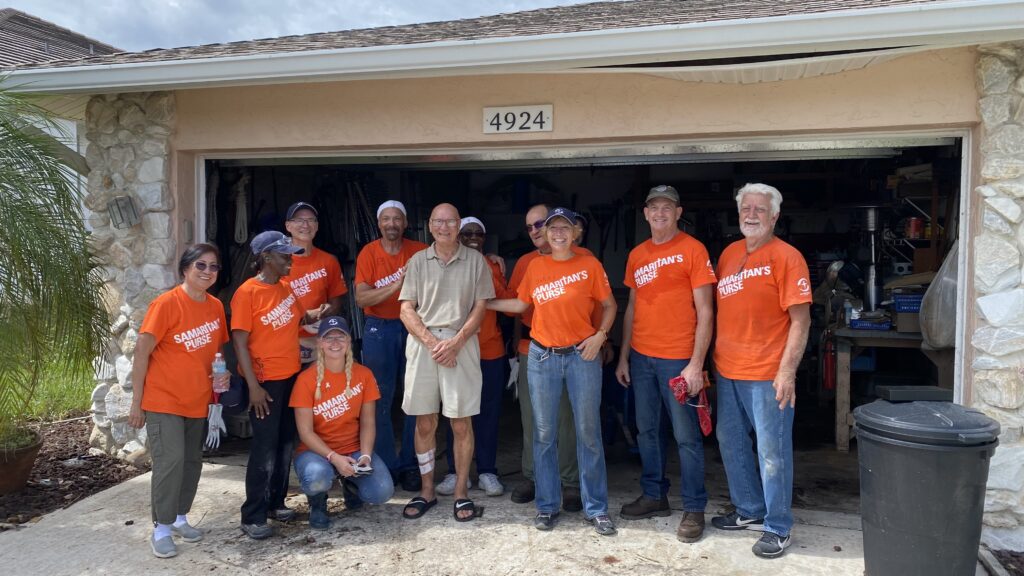
After holding hands and praying with Eric, several of our team members engaged with him more, asking about England and telling him we were happy to help. His initial reluctance to let us into his world was completely shattered at this point as he happily inquired about where we all lived and whether we’d ever visited the UK before.
As we were leaving, Eric again reiterated how much he appreciated our help, noting that he’d enjoy telling his wife about our assistance when he talked to her later.
After packing our supplies into our SP truck, our team loaded onto our bus and drove down the street to our next destination. Finding a dead-end, we looped around and drove past Eric’s house again to leave his community.
Looking over to his house, I was delighted to see Eric standing in front of his home, waving demonstrably to our bus. The action made me laugh with joy to see this stoic man demonstrating such exuberant emotions as we drove by. God had allowed us to break through his barriers to let the love of Christ in.
As with my Good Samaritan Moe and the neighbors I met two days prior, only God knows whether any of our words or actions, performed in Christian love and faithfulness, will bring about a change in Eric’s heart to bring him closer to Christ.
And that’s okay – because God’s the one in the life-changing business. Not me. As Christians, we’re only asked to be Christ’s hands and feet, showing His love and charity to all we encounter.
The rest is up to our heavenly Father. As Franklin Graham said in our SP orientation video, “God will use you in a powerful way to make an eternal difference.”
May it be so, Lord. Every day. In every possible way.
